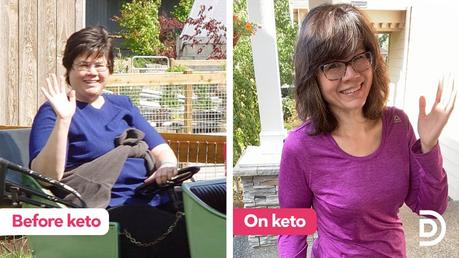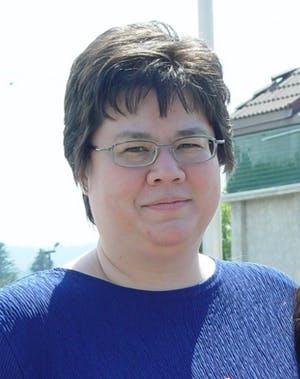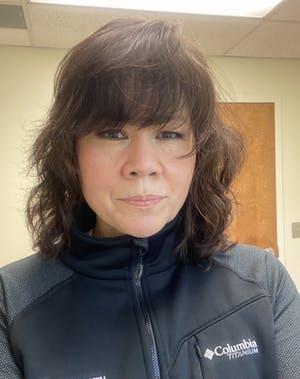
When Kathy first discovered a low-carb diet, it was a life-changing revelation.
After decades of struggle with weight and high blood sugar, she was able to get out of the morbid obesity range and reverse her type 2 diabetes.
But after a while, she found herself eating too much fat and over-eating low-carb, high-fat treats. During a difficult time in her life, she regained almost all her lost weight.
But when her physician, Dr. Ted Naiman, started recommending a higher protein, lower carb plan, she decided to double her protein intake.
The result was 130 pounds (60 kilos) lost to date and revitalization of her health.
"Combining higher protein with intermittent fasting worked like gangbusters," Kathy says.
Kathy's story has been edited for length and clarity.
What's your name, age, and where do you live?
I'm, Kathy, age 56, and I live near Seattle, WA.
How did you decide to do low-carb or keto?
Luckily, I live near the clinic where Dr. Ted Naiman works as a primary care physician. After my old doctor left the practice, the clinic placed me in an open appointment to see Dr. Naiman.
When he walked in, I was disappointed at how young he looked, but I quickly forgot all about that. He's somehow really laid-back but intensely engaging. I wasn't up for another lecture about my weight and worsening diabetes, but I sat up and paid attention when he started to say things that were shocking and new to me.
He went over all the ways I was manifesting "metabolic syndrome." (My face got a little hot at that.) But he quickly moved to how I could turn this all around with a low-carbohydrate diet. (What? Isn't that supposed to be the diet that will kill you?! LOL).
He described the post-meal hunger crashes I was having and how nixing carbs would resolve this.
He described the post-meal hunger crashes I was having and how nixing carbs would resolve this. He adjusted my medications and added metformin, which is known to cause weight loss or counterweight gain induced by other medications. He also added Wellbutrin (which years later became part of the formulation for the weight-loss drug Contrave) but I only took Wellbutrin for about six months. He suggested low-carb books and resources for me.His solutions netted a quick 10-pound weight loss in just a few weeks. Suddenly I felt empowered. I felt motivated.
That first appointment represents one of those moments that completely changed the trajectory of my life.
But I actually have two legs of my low-carb journey. On the first one, I managed to get out of the morbid obesity range to the obese range, and my A1c dropped out of the diabetic range to pre-diabetic.
However, during a long stretch of difficult circumstances including the tragic death of my husband, I went through extreme swings in my weight. I came out of all that nearly back to square one. (I regained nearly all the weight between 2015 and 2017).
The second leg of my low-carb journey started in 2019 after Dr. Naiman revised his recommendations to a higher protein approach.
I was now in my mid-50s, and it seemed like losing all the weight would be even harder than ever. But I was wrong.
I finally achieved my goals of reversing obesity and obtaining a normal A1c below 5!
I started eating higher protein in the summer of 2019. I lost more weight and I lost it much faster than I did before. I finally achieved my goals of reversing obesity and obtaining a normal A1c below 5! And I could easily enjoy my eating plan, even during vacations and holidays.While Dr. Naiman can't be everyone's doctor, he has laid it all out in his book The P:E Diet. You can also find him on Twitter, Instagram, and of course on Diet Doctor.
Editor's note: You can also look for low-carb friendly doctors, dietitians, coaches and other health providers near you on our "Find a Provider" map.
Did you have any health or weight struggles before going low carb or keto?
I've struggled with my weight my entire life. A doctor said I needed to lose 20 pounds when I was in first grade. I was pushing 200 pounds when I was only 13.
My high blood sugar problem started in my late teens, and I was diagnosed with diabetes and morbid obesity in my mid-30s.
I joined commercial weight loss programs many times to lose some weight, only to gain it all back plus more.
I joined commercial weight loss programs many times to lose some weight, only to gain it all back plus more. I tried liquid diets and diet pills.I even had gastric sleeve surgery at one point. The surgery did nothing to reduce my appetite. In fact, it made my problems with food even worse, and I ended up even heavier than I was before. I have never felt worse about my weight than I did at that point.
After these failures, I kept reverting back to the standard American diet because I felt nothing worked anyway.
What does a typical day of eating and/or fasting look like for you now?
I love intermittent fasting (IF). I like to mix up the schedule around my work or social life. I rarely eat breakfast and often push lunch to the afternoon.
I occasionally use a 23-hour fast (OMAD) but, there are many weeks where I don't do this at all. I target an eight-hour eating window and fast for 16 hours most days (16/8).
Here is a typical day:
-
Breakfast
Coffee (always!), either iced or with sugar-free almond milk. -
Lunch
Chaffles (eggs and low-fat mozzarella cheese cooked in mini waffle makers) topped with a generous portion of Greek yogurt and slightly defrosted frozen strawberries plus sugar-free syrup. -
Dinner
Generous portion of grilled leaner meat (flank steak, skinless chicken thighs, salmon, pot roast, lean burger, etc.), sliced tomatoes and salsa, and grilled asparagus. -
Dessert or snack
Frozen low-fat Greek yogurt "bark" that I make myself, drizzled with dark chocolate, or low-fat Greek yogurt with berries, or a Fairlife protein shake.
In what ways has your health improved?
People are most impressed with my weight loss - I have now lost over 130 pounds (60 kilos).
People are most impressed with my weight loss - I have now lost over 130 pounds (60 kilos).After a lifetime of high blood sugar and diabetes, there's no sign that I have any diabetes damage to my eyes. I've been worried about this all my life - my mother and grandmother both lost their vision to diabetes.
I'm in a better mood on a daily basis. I'm not as anxious when life's challenges arise. It is hard to pinpoint how much of this is due to the diet vs. being more active, but it doesn't really matter - I feel that these things just naturally go together.
I love pictures of my face-to-face comparisons. I actually made them because some people thought my before-and-after photos were fake.


Have you learned from any mistakes?
Yes. While I lost weight on the first leg of my low-carb journey, eventually I was eating too much fat and too little nutrition.
For example, I followed recipes that mixed sweeteners, cream cheese, chocolate, and other ingredients to create desserts. I dipped spicy pork rinds into sour cream.
Some people can eat these kinds of tasty treats, but I cannot. I ate too much of these, gained weight, but failed to recognize the problem. I believed the myth that protein "turns to sugar in the body" and causes weight gain. I thought targeting fat was what I was supposed to do. That was my biggest mistake.
When Dr. Naiman brought up higher protein to me, I felt he was all wrong, but I could see he was starting a protein movement in the low-carb community and became curious about it.
I looked at his infographics (on Twitter and Instagram) and listened to interviews (Diet Doctor on YouTube is really great) explaining concepts like "protein is a building block" and not something the body utilizes to build fat stores. I learned how beneficial protein is for health and the reduction in appetite. I calculated that I was only eating half the protein he recommends.
Combining higher protein with intermittent fasting worked like gangbusters.
So, I doubled my protein intake. I stopped picking up the Costco-sized butter and half-and-half cream. Combining higher protein with intermittent fasting worked like gangbusters.Do you think exercise is necessary for success on low carb?
To lose weight? No. Weight loss is 95% diet. But exercise ramps up the little fat-burning factories in your cells called mitochondria and primes you for weight loss (a tip from Dr. Naiman). Exercise also makes you feel great both mentally and physically.
As a larger person, I started with exercise walking hills and using a rowing machine (another tip from Dr. Naiman). I use the rower to do high-intensity interval training (aka HIIT), which is a way to get a beneficial workout in just a few minutes. I do short HIIT "sprints" on my rower.
I also do Dr. Naiman's "no gym" strength training exercises. Diet Doctor has a great video (the cruise ship video) of Dr. Naiman demonstrating how to get started if you are a beginner. I used the kitchen counter to do standing push-ups. I started squats by sitting and standing from a chair. I started pull-ups on the ground under a dip bar (aka bodyweight rows).
In all, I spend less than 10 to 15 minutes a day exercising.
What are your top three tips for people starting low carb?- Reduce the carbs slowly over a few weeks. I had tried to do "Atkins induction" twice and fell flat both times.
- Try eating bacon and eggs as your first meal of the day. This will help you get off of the snacking train because you won't have that blood sugar crash/post-meal hunger situation.
- Definitely get support in the way that works for you. Those first few weeks can be especially hard, so don't give up! You'll get over that hump, and then you will be on your way to greater health!
If you are still reading this far, thank you for reading my story. I truly hope this helps someone. I wish you the best of luck and the best of health. And if anyone wants to follow me, they will find me on Twitter. I am Key Tones@apowersurfer.
Kathy, your success with a higher protein, lower carb diet will inspire others who are wondering about this approach. Congratulations on your tremendous achievements.
~Anne Mullens

